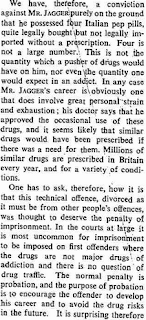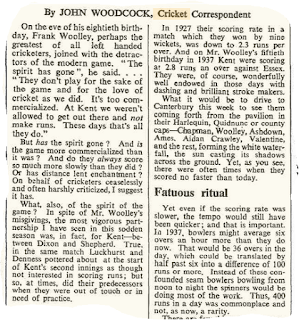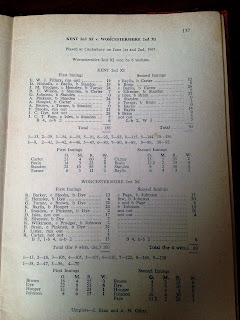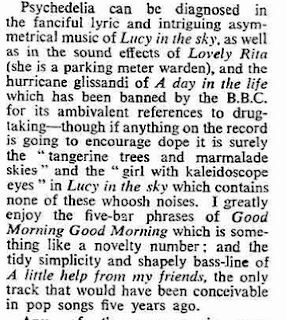Kent were second in the table by the end of this week
after a rain-induced draw against Northamptonshire and a strange game at the
Oval that was a two-and-half-day funeral dirge before becoming an Iron Maiden
gig on the last afternoon. The Times correspondent,
John Silchester, was impatient with Kent’s “care-worn, over responsible” approach
on the first day:
On the second day, on which only 173 runs were scored, Silchester
was prepared to make the “dully difficult” pitch take its share of
responsibility. Like his colleagues around the country, he was impressed by Norman
Graham:
Set 250 to win, Surrey batted with an aggression absent in
the game thus far, a triumph of “mind over marl” for Silchester. Edrich and
Stewart put on 133 for the second wicket, taking Surrey to a position of 111 to
win from 95 minutes with nine wickets left. But no other batsman reached double
figures as Underwood’s slide-rule accuracy and variations of pace removed both
partners and three of the rest as those nine wickets mustered just 38 between
them.
Who was this John Silchester, with his shrewd observation
and pleasing phrases? Why had I not heard of him before? It should have been
obvious given that Silchester was a Roman settlement just north of Basingstoke,
the home town of John Arlott, who took the name as his Times identity, the Observer having
exclusive use of his real name. As a disguise it was as effective as a comedy
moustache. It was in January 1967 that The Times had started giving its
correspondents a byline. For the best part of two centuries before that they
had been anonymous. Has there ever been a better collection of cricket writers
on one paper at one time than Woodcock, Gibson, Arlott and Thomson? It was in
the following year that Arlott became the cricket correspondent of The Guardian, under his own name.
As we approached high summer county cricket was becoming
more peripatetic. This week Peterborough, Colchester, Bournemouth, and Lydney were
among the Championship venues. Gloucestershire played at Lydney, the other side
of the Severn in the Forest of Dean from 1963 to 1969. At least by 1967 the Severn
Bridge was in place; before then it would have taken a couple of hours to drive
there from Bristol.
Gloucestershire have long been cricketing missionaries,
taking their message to new places in the county and beyond. During my 19 years
in Bristol I watched them play at home at eight grounds, one more than Kent
home venues at which I have got out the binoculars and scotch eggs. Those eight
include Moreton-in-Marsh (another long drive from Bristol, especially for the one
ball of a 1991 Sunday League match that they got in before the rain came), Swindon
(in the shadow of the main stand of Swindon Town FC), the Wagon Works and
Archdeacon’s Meadow in Gloucester, and three grounds in Cheltenham. Beside the
College, there was the Victoria Ground against the Indians in 1986 and the Dowty
Arle Ground for a Benson and Hedges zonal game in 1992, both because of
building work at Bristol.
The defeat of Surrey moved Kent to second in the Championship,
four points behind Yorkshire, who had a game in hand. Leicestershire slipped to
third, drawing against Somerset thanks to a fifth-wicket partnership of 148
between Barry Dudleston and Jack Birkenshaw. Dudleston made the first of his 32
first-class hundreds. Regular readers of My
Life in Cricket Scorecards will know that Dudleston was to become my
personal ski instructor almost two decades later, so commemorating his
maiden century is the least I can do. No cricketer has had his name misspelled
more often than Barry and The Times marked
the occasion by doing so in two different ways; Duddleston in the headline and
first two paras and Duddlestone thereafter.
England won the second test in four days despite losing
two half days to rain. A first innings of 386 was enough for a winning margin
of an innings and 124. On paper they don’t look a bad side, with Pataudi,
Wadekar, Borde and Hanumant Singh among the batsmen and the quartet of four
great spinners. But they were mostly at the start of their careers and
inexperienced in English conditions; having no fast bowlers worth the name didn’t
help either.
In the wider world the big news story of the week was the
trial of Mick Jagger, Keith Richard and others on drugs charges. Jagger was
sentenced to three months for the possession of four pep pills (as they were
called then) which he had purchased legally in Italy, but which it was technically
illegal to bring into Britain. This spurred the editor of The Times, William Rees-Mogg (father of Jacob Rees-Mogg) to write
his most famous leader “Who Breaks a Butterfly on a Wheel?” in which he
stridently condemned the sentence.
Fifty years later, today’s Times features an interview with Jagger in which he describes that
edition of The Times being delivered
to his cell: “The Times was thrown through the slot in my cell door, and
thudded and hit the concrete floor of my cell and I thought, ‘What the f*** is
that?’ I thought, ‘Well, that’s nice, they’re delivering me The Times’.” A
lovely story, but had Mick scanned the front page more carefully he would have
read an account of his release from Brixton prison on bail the previous
afternoon.
Wimbledon’s first week was in progress. It was the last amateur
championship and the first British outside broadcast in colour. This was
independent of the black-and-white coverage and required its own commentary,
which was provided, rather bizarrely, by the DJ Keith Fordyce.
David Dimbleby was a Panorama reporter in 1967, though
this didn’t stop him writing to The Times
in support of Israel, a freedom of expression that he and other BBC presenters
do not have today.











